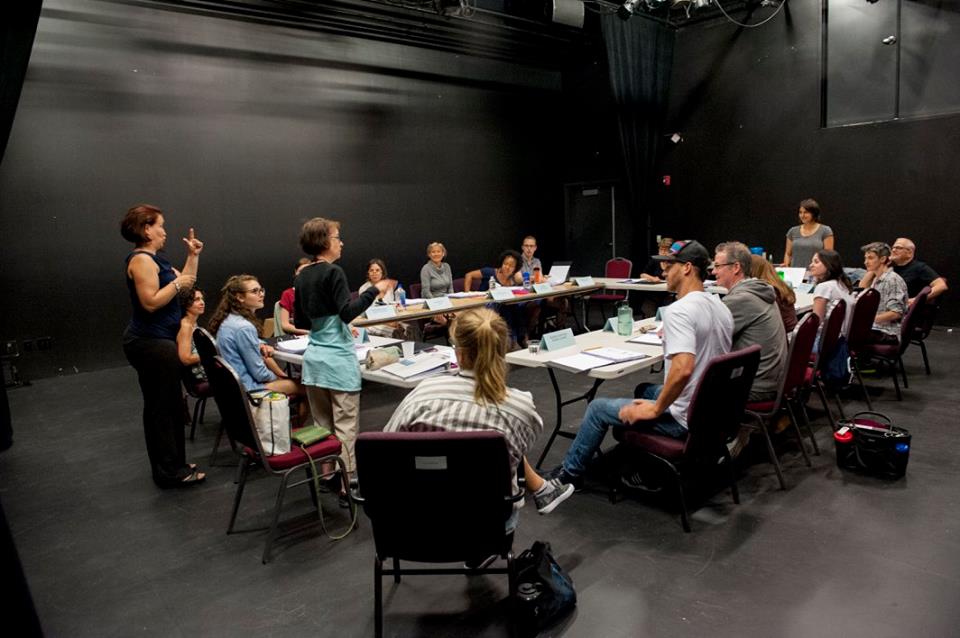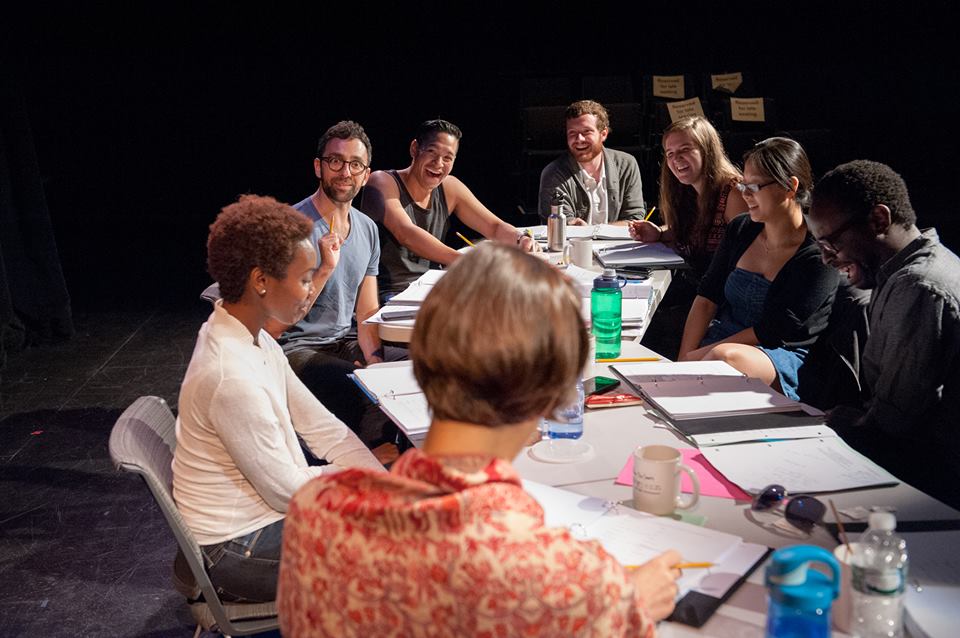PlayPenn is one of America’s most important play development conferences. Many of the playwrights featured in the three week conference have gone on to produce major regional works.
Each year, the conference invites six interns—writers, performers, and technicians—to work alongside experienced professionals to experience playwriting, dramaturgy, directing, producing, etc. in a concentrated and fulfilling environment in Philadelphia. On a daily basis, each intern assists a collaborative team in the development of one of six plays whose playwrights have been invited to the conference. Interns also assist in the administrative, front of house, technical, and public relations responsibilities of the conference.
Interns participate in a playwright’s workshop led by a professional playwright, culminating in the public presentations of their own plays, performed by conference artists. For more details, visit playpenn.org and apply by April 1, 2017.
In this three-part interview, Henrik Eger spoke to previous conference interns Anita Castillo-Halvorssen, Jillian (Jilly) Schwab, and Patrick Ross. As we find, the conference can be a stepping stone for assistants as well as the playwrights they help.

Background
Henrik Eger: Tell us about your background with theater arts.
Patrick Ross: It was all very accidental. When I was a high school sophomore, the theater teacher stopped me in the hallway—a woman I had never met—and demanded I sign up for her class. I was hesitant, my only previous performance having been as a very reluctant Joseph in the St. Mary’s Preschool Nativity Pageant—so I declined. The class was full anyway. She then did something I believe was illegal, and ejected a student from the class and inserted me without my permission.
She gets a “special thanks” in all my programs now.
My first performance was in her production of A Midsummer Night’s Dream as Peter Quince. I acted throughout high school, and continued acting when I arrived at Swarthmore College—where I graduated to Demetrius. I soon discovered that I enjoyed directing more, so I began to do that, and ended up devising and writing the plays I was directing. I’m still growing into it, but I think I’m settling into the identity of a director-playwright, and definitely as a creator of new work.
Jilly Schwab: I did everything and anything I could, performance-wise. My family is very creatively inclined, and my two siblings and I were thrown into music and performance from a tiny age. I was a good little liar when I was younger, and my parents definitely knew.
I attended Rider University as a Musical Theatre Major and it was a difficult adjustment. For the first time, I confronted the reality of making a career out of theatre arts and it rocked my then-18 year old brain at the time. I sort of became disillusioned. I had to make a choice, and chose to continue my performance track. I took some time off from college and resumed closer to home at Arcadia University. Through my professors, I began to integrate into the Philly theatre community and learn self-sufficiency in becoming a theatre artist.
Anita Castillo-Halvorssen: My first serious role was Anna in Landford Wilson’s Burn This during my second year at Swarthmore, and I was worried I would be way in over my head. Jeannette Leopold, my director, gave me simple instructions: “It’s there in the text. You don’t need to force anything. Anna will come out of you, and who you are.” I quickly realized that the college’s approach to theater is an immensely practical one. The department strives to ensure that students graduate with a knowledge of theater history and theory, especially of the 20th Century, in order to understand what artists have discovered about storytelling and performance forms through ancient traditions from around the globe.
Henrik: How did you find out about PlayPenn?
Patrick: Word of mouth. Three of my supervisors at the Lang Performing Arts Center—where I work as an overhire technician—all recommended PlayPenn to me, separately of each other. There’s that rule for writers—if just one person makes a critique, you can safely ignore it; if three people tell you to do something, they’re probably right.
Jilly: After a scene-study class, Kathryn Petersen, one of those lovely life-mentors of mine, mentioned the PlayPenn internship program. I jumped on it immediately.
Henrik: What attracted you to PlayPenn, so much so that you applied for the position as an intern?
Jilly: I was impressed by the number of plays [developed at PlayPenn] that had reached production on a national scale. At the time I was researching this project, I had the privilege of taking a playwriting class with Larry Loebell. The class took on a very collaborative dynamic and improved my own writing in such a way that I wanted more opportunities to seek out that same kind of dynamic. I found that quality with PlayPenn.
Anita: To work for PlayPenn seemed enormously attractive to me, simply because I knew I would have some role in helping new stories be heard. Even if that role were to be “give the artists coffee” or “take out the artists’ trash,” I knew it would be special to be in a room filled with these playwrights, sharing their feedback and ideas with one another.
Patrick: I had seen James Ijames act before and knew him as a formidable voice. I was impressed that it was writers of his caliber who were participating in this conference. When I saw that James was one of the playwrights involved, I knew it was going to be good.

Collaborative Process
Henrik:What were the main tasks that you were asked to do?
Anita: The tasks that stood out to me were to do each playwrights’ stage directions justice by reading them clearly and engagingly at public showings, to keep actors and team members up-to-date on line changes and new page additions each day, and to generally be a supportive and respectful warm body in the rehearsal room. Another task that I appreciated was assisting dramaturg Heather Helinsky with Norwegian translations for JT Rogers’s Oslo, and recording audio tracks to help actors practice pronunciation of lines in Norwegian.
Patrick: Artistically speaking, each intern was assigned to a play, where we operated essentially as assistant dramaturgs. We were primarily tasked to observe.
Henrik: You were assigned to work with one playwright and his or her team. Tell us about your observations seeing professionals work with each other.
Anita: I was pleasantly surprised to find that PlayPenn really is about the playwright’s vision of the play. It is about the playwright’s hopes to tell a story truthfully, whatever that means to them. David Jacobi [writer of Widower] often mentioned what is possible on stage in a technical and logistical sense. [Director] Anne Marie [Cammarato] gently reminded him to forget all that, and remember that design will be the designers’ responsibility. His responsibility is to tell the story. She even requested that actors focus on reading their scripts, and less on acting them, during rehearsals and public showings—because we want to show the audiences the ability of the text to make them feel, not necessarily of the actors’ talents.
Henrik: PlayPenn prides itself on the “ferociouscommitment to the collaborative process” of everyone involved. Could you give an example or two where you saw this commitment in action?
Anita: In the Widower rehearsal room, David [Jacobi] might wonder about something a child would do or feel in a specific situation—as Widower’s protagonist is a twelve-year-old boy. Anthony Flamminio, as a Philadelphia actor of about the same age, could then answer the question honestly.
Patrick: Well, the White rehearsal room [the new play by James Ijames] was collaborative heaven. All voices were heard and really valued in that room—even mine.
Henrik: In North America, both Paul Meshejian and Michele Volansky are legendary for nurturing new plays. What was it like working with them and learning from them directly?
Anita: At first, Paul scared me half to death—and he is probably aware of that. He’s a no-funny-business kind of person, and he needs his collaborators to earn his trust in their ability to take this work seriously. But Paul is also very open and charismatic, which he demonstrated particularly when I had the chance to work with him as the intern for Rick Dresser’s War Stories. He knows that personal stories are crucial in understanding a text. He, and others in the artistic team, including Rick, would often tell stories that gave us deeper perspective into the dramaturgy of the play—giving us emotional context to generate new ideas about the play’s complex characters.
Michele’s warmth comes through her humor, which is a superpower she uses in rehearsal rooms as well as social situations to ensure that everyone is comfortable and cheerful. I think Michele de-stresses people enough to force their best work out of them. One of the most memorable pieces of advice that Michele drove home for me was that, as dramaturgs, we are sometimes serving the playwright best just by being there in the room as the play grows.
Patrick: Except for Paige [Espinosa], who interned in their rehearsal room, we didn’t really engage with Paul and Michele as artists. I’m grateful for this. Instead, I met Paul and Michele the people, and I think you’re right to call them legends. They are whip-smart, carefree, and viciously focused on their missions. They are the types of people who constantly, unthinkingly, put artists before themselves. It’s astounding.
Jilly: Paul and Michele are a powerhouse team. They kept me grounded in the core of what PlayPenn is really all about. But they also were encouraging me to explore my own sense of artistry. They nurture new work, but they also know that nurturing those involved in the making of it is of the utmost importance. When I had my interview with Paul, he was keen on learning what I wanted to get out of the entire experience.
Read the other two group interviews with the PlayPenn interns:
- Part 2: Working with some of America’s most promising playwrights.
- Part 3: When young theater people come into their own.
Read interviews with PlayPenn’s Artistic Director Paul Meshejian:

Nossa, que diferente, já favoritei